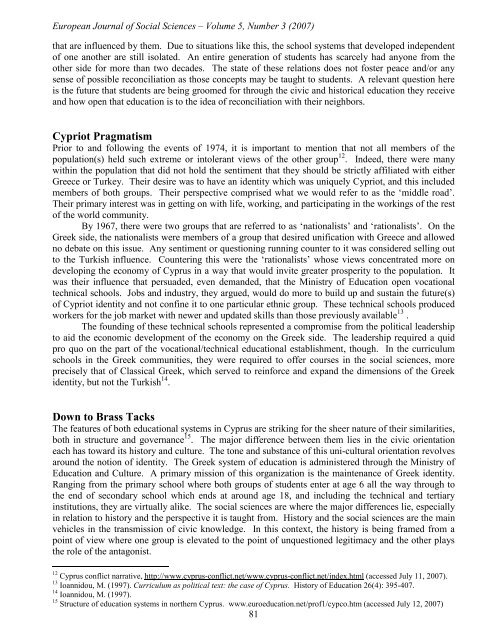european journal of social sciences issn: 1450-2267 - EuroJournals
european journal of social sciences issn: 1450-2267 - EuroJournals
european journal of social sciences issn: 1450-2267 - EuroJournals
You also want an ePaper? Increase the reach of your titles
YUMPU automatically turns print PDFs into web optimized ePapers that Google loves.
European Journal <strong>of</strong> Social Sciences – Volume 5, Number 3 (2007)<br />
that are influenced by them. Due to situations like this, the school systems that developed independent<br />
<strong>of</strong> one another are still isolated. An entire generation <strong>of</strong> students has scarcely had anyone from the<br />
other side for more than two decades. The state <strong>of</strong> these relations does not foster peace and/or any<br />
sense <strong>of</strong> possible reconciliation as those concepts may be taught to students. A relevant question here<br />
is the future that students are being groomed for through the civic and historical education they receive<br />
and how open that education is to the idea <strong>of</strong> reconciliation with their neighbors.<br />
Cypriot Pragmatism<br />
Prior to and following the events <strong>of</strong> 1974, it is important to mention that not all members <strong>of</strong> the<br />
population(s) held such extreme or intolerant views <strong>of</strong> the other group 12 . Indeed, there were many<br />
within the population that did not hold the sentiment that they should be strictly affiliated with either<br />
Greece or Turkey. Their desire was to have an identity which was uniquely Cypriot, and this included<br />
members <strong>of</strong> both groups. Their perspective comprised what we would refer to as the ‘middle road’.<br />
Their primary interest was in getting on with life, working, and participating in the workings <strong>of</strong> the rest<br />
<strong>of</strong> the world community.<br />
By 1967, there were two groups that are referred to as ‘nationalists’ and ‘rationalists’. On the<br />
Greek side, the nationalists were members <strong>of</strong> a group that desired unification with Greece and allowed<br />
no debate on this issue. Any sentiment or questioning running counter to it was considered selling out<br />
to the Turkish influence. Countering this were the ‘rationalists’ whose views concentrated more on<br />
developing the economy <strong>of</strong> Cyprus in a way that would invite greater prosperity to the population. It<br />
was their influence that persuaded, even demanded, that the Ministry <strong>of</strong> Education open vocational<br />
technical schools. Jobs and industry, they argued, would do more to build up and sustain the future(s)<br />
<strong>of</strong> Cypriot identity and not confine it to one particular ethnic group. These technical schools produced<br />
workers for the job market with newer and updated skills than those previously available 13 .<br />
The founding <strong>of</strong> these technical schools represented a compromise from the political leadership<br />
to aid the economic development <strong>of</strong> the economy on the Greek side. The leadership required a quid<br />
pro quo on the part <strong>of</strong> the vocational/technical educational establishment, though. In the curriculum<br />
schools in the Greek communities, they were required to <strong>of</strong>fer courses in the <strong>social</strong> <strong>sciences</strong>, more<br />
precisely that <strong>of</strong> Classical Greek, which served to reinforce and expand the dimensions <strong>of</strong> the Greek<br />
identity, but not the Turkish 14 .<br />
Down to Brass Tacks<br />
The features <strong>of</strong> both educational systems in Cyprus are striking for the sheer nature <strong>of</strong> their similarities,<br />
both in structure and governance 15 . The major difference between them lies in the civic orientation<br />
each has toward its history and culture. The tone and substance <strong>of</strong> this uni-cultural orientation revolves<br />
around the notion <strong>of</strong> identity. The Greek system <strong>of</strong> education is administered through the Ministry <strong>of</strong><br />
Education and Culture. A primary mission <strong>of</strong> this organization is the maintenance <strong>of</strong> Greek identity.<br />
Ranging from the primary school where both groups <strong>of</strong> students enter at age 6 all the way through to<br />
the end <strong>of</strong> secondary school which ends at around age 18, and including the technical and tertiary<br />
institutions, they are virtually alike. The <strong>social</strong> <strong>sciences</strong> are where the major differences lie, especially<br />
in relation to history and the perspective it is taught from. History and the <strong>social</strong> <strong>sciences</strong> are the main<br />
vehicles in the transmission <strong>of</strong> civic knowledge. In this context, the history is being framed from a<br />
point <strong>of</strong> view where one group is elevated to the point <strong>of</strong> unquestioned legitimacy and the other plays<br />
the role <strong>of</strong> the antagonist.<br />
12<br />
Cyprus conflict narrative, http://www.cyprus-conflict.net/www.cyprus-conflict.net/index.html (accessed July 11, 2007).<br />
13<br />
Ioannidou, M. (1997). Curriculum as political text: the case <strong>of</strong> Cyprus. History <strong>of</strong> Education 26(4): 395-407.<br />
14<br />
Ioannidou, M. (1997).<br />
15<br />
Structure <strong>of</strong> education systems in northern Cyprus. www.euroeducation.net/pr<strong>of</strong>1/cypco.htm (accessed July 12, 2007)<br />
81

















